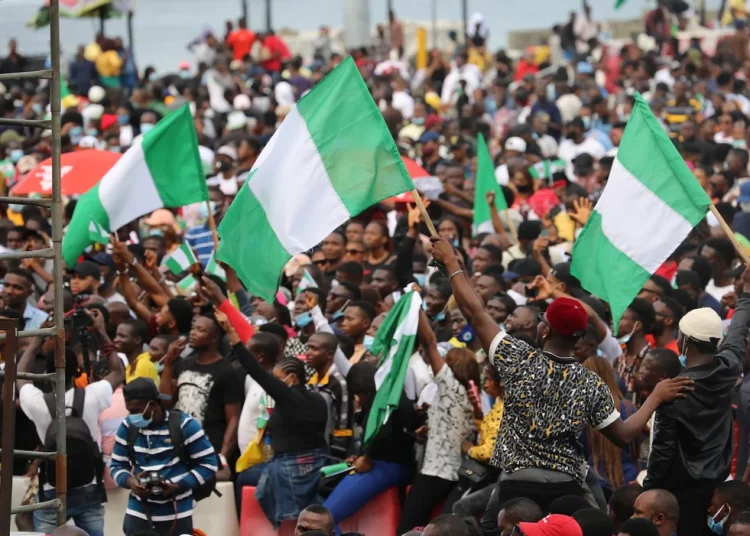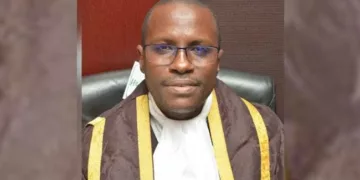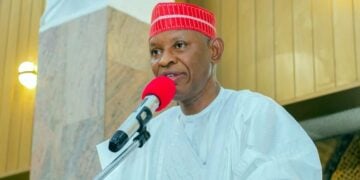A report by the International Organisation for Peace Building and Social Justice (PSJ) has revealed that 70 percent of Nigeria’s youth embrace crime due to lack of economic opportunity and poverty in the land.
The report obtained by LEADERSHIP said there is a causal link between poverty and insecurity ravaging the country. The report said poverty and lack of economic opportunity has left Nigeria’s sizable population of young people with limited economic prospects.
“With around 70% of the population under 35 years of age, poverty and a lack of economic opportunity are driving many younger people to turn towards criminality and terrorism to earn a living, to confer status, and to survive. Extensive qualitative research has established a clear causal link between poverty and insecurity.”
The report noted that the level of insecurity in Nigeria has reached the point of crisis, adding that across the country, people are increasingly living in fear and concerned for their safety and that of their families.
“There is currently little to suggest that the situation is improving. Instead, the analysis contained in this report indicates that Nigeria’s security is continuing to deteriorate,” the report stated.
The report raised the alarmed that the consolidation of an ISWAP foothold in Nigeria threatens to unleash an even more violent form of Islamist extremism, one better resourced and coordinated than its rival Boko Haram.
It said the increasing prevalence of kidnappings also threaten to result in a collapse of public confidence in the police, military, and security services and, by association, the government.
“Consequently, the extent of the crisis has led many commentators to express a fear over the future of the federation itself. The prospect of state collapse would be catastrophic, for Nigeria, for Africa, and for the world.”
Alongside the immediate humanitarian implications, European nations are likely to see a major increase in irregular migration emanating from Nigeria, whilst vast swathes of Nigerian territory would become ungoverned, with all of the implications for regional and international security that this implies.
“It is in all of our interests to prevent Nigeria deteriorating from a fragile to a failed state,” the report noted.
On the forthcoming elections, the report said 2023 elections represent an inflection point for Nigeria as all candidates for the presidency are likely to place security at the forefront of their campaigns.
“However, unlike the elections of 2015 and 2019, whoever emerges as President needs to deliver a rapid and transformative improvement in security. The chronic insecurity facing Nigeria is proving to be a major obstacle to the country fulfilling its vast potential. Until Nigeria is able to address it, it cannot emerge as both a regional and continental leader, setting an example to the world of what African nations can achieve. It is in all of our interests to prevent Nigeria deteriorating from a fragile to a failed state,” the report said.
The report recommended that to address Nigeria’s security crisis and restore public confidence in the efficacy and integrity of the country’s security architecture, Nigeria should consider:
“Creating an independent commission to identify Nigeria’s security priorities and a means of addressing them. The commission should be empowered to consider how best to balance responsibility for providing security between the states and the federal government, and to provide recommendations. The commission should include independent external advisors.
“Commissioning a nationwide qualitative opinion survey to determine public attitudes to Nigeria’s security crisis, their priorities, and recommendations.
“Requiring state governors to publish an annual security audit, detailing how they have utilised their security funding and providing an impact assessment. Each annual audit should be subject to review by the National Bureau of Statistics.
“Devising a fully funded border security strategy by 2023, utilising external (and private sector) expertise to oversee border administration in the country’s most strategically sensitive borders crossings.
“Prioritising regional and international military and intelligence cooperation to deliver a decisive strategic blow to Islamist extremists in the country’s northeast.
“Inviting independent international election observers to monitor and report on the conduct of the 2023 presidential election in each of Nigeria’s 36 states.
“Encouraging both PDP and APC candidates to commit to participating in televised presidential debates, one of which should focus on proposals to address Nigeria’s security crisis.
“Requesting that all candidates for the presidency commit to publishing a fully costed security manifesto by 31 December 2022.
“Creating an independent panel of experts to review the implementation of Nigeria’s National Security Strategy and to make recommendations as to how it can be strengthened.
“Committing to an annual defence and security audit process, examining the government’s major procurement decisions and providing publishable assessments on value for money and perceived levels of corruption.
“Adopting and implementing all UNHCR anti-trafficking recommendations. Making the post of National Security Adviser subject to a confirmation hearing from the Nigerian Senate. Ensuring the role of Chair of the INEC is subject to legislative approval.
“Improving legislative oversight of defence procurement by submitting all major project decisions to scrutiny by the Senate Committee on Defence.
“Committing the Senate Committee on Defence to creating an independent external expert advisory panel to analyse all procurement decisions and making their findings available to the Nigerian public.





